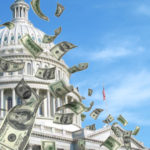 by Steve HanerFirst published today by the Thomas Jefferson Institute for Public Policy.
by Steve HanerFirst published today by the Thomas Jefferson Institute for Public Policy.
Any claim that Virginia cannot reduce taxes on its citizens without damaging state programs has been further eroded by two recent announcements.
The explosion of revenue from recent state tax increases is continuing into this new fiscal year, pointing to a potential repeat of last year’s $2.6 billion general fund surplus, which the state’s leadership is still trying to attribute to anything but its tax legislation. In the first three months of this new fiscal year general fund revenue is running $570 million ahead of last year’s record amounts, blowing out projections that assumed last year’s surplus was pandemic-related lagniappe.
The flood of money wasn’t related to the pandemic, not totally. It was related to tax policy decisions made in 2019, 2020 and 2021, the bulk of the surplus revenue coming from higher individual and corporate income taxes.
Adding to that, the Virginia Retirement System told legislators Monday that it has done so well with its investments (a 27% return in one year), the next General Assembly will be able to reduce the amount of cash it invests in the next few years, a significant reduction in annual costs.
The largest reduction in required contributions will be to the teacher retirement account, which will benefit both the state and the local school system budgets.
Normally the state and localities need to budget for increases in the annual pension contribution. A fiscal consultant to local governments told the Richmond Times-Dispatch the good investment news points to a savings, instead, of about $350 million over two years, about $210 million of the benefit accruing to the localities.
That would compensate quite a bit for the lost local revenue that would result (for example) if Virginia eliminated its existing 2.5% sales tax on unprepared food. Not long ago the same fiscal consultant was worried that the local governments could not afford any such reduction. There is no longer any question they can.
Governor Ralph Northam’s administration will not admit that its tax policy changes are driving the surpluses. This from that Times-Dispatch article:
“Overall, this quarter’s revenue performance was strong,” said Secretary of Finance Joe Flores, who will review the revenue outlook with General Assembly budget committees next week. “It is important to remember that we are comparing this quarter’s performance to the heart of the pandemic closures last year when there was still not a vaccine on the horizon.”
You can fool some people that easily, but that’s nonsense. Just a year ago Flores’s predecessor wrote this in the same report at the same point in time:
On a fiscal year-to-date basis, total revenue collections rose 9.9 percent through September, well ahead of the annual forecast of a 1.8 percent decline.
The COVID-19 economic trough was earlier in 2020 and the state was on the upswing by fall. But ignore all that and seek a comparison from before the pandemic even started.
In the first three months of this fiscal year, the corporate income tax collected $459 million, compared to $253 million four years ago. An 81% growth in collection cannot be attributed to inflation or economic growth or better corporate profits. It grew out of the General Assembly’s conscious desire to capture every dollar of the state revenue windfall created when it adopted all the new tax rules created by the federal Tax Cuts and Jobs Act of 2017.
The Assembly did make some adjustments to personal income taxes to compensate for the federally-created windfall. Even so, first quarter personal income tax revenue is up 24% ($800 million) in four years. Collections in those two categories are running $1 billion ahead of four years ago. After three months.
How to cut taxes? In the same Joint Legislative Audit and Review Committee (JLARC) meeting where the good news from VRS was discussed, legislators were also briefed on the status of a study on the state’s income tax. A General Assembly resolution has asked for recommendations on how to make the income tax more progressive, meaning shifting the burden off the lowest income categories.
The interim report was basically just a primer on the issue, with the recommendations not expected for another full year, in time for the 2023 General Assembly. That timing is problematic as both the House and State Senate face elections in 2023, but the Assembly set the deadline.
The data presented Monday by JLARC do point to some obvious steps, steps which won’t be unfamiliar to anyone familiar with previous recommendations from the Thomas Jefferson Institute:
“Bracket creep has made Virginia’s income tax less progressive over time” reads the headline on slide 25. For a typical taxpayer, the study indicated, income rising with inflation has gone up 96% since 1990, but their state income tax has rising 152% percent. That is bracket creep. Rising inflation will make it worse rapidly.
“Raising Virginia’s standard deduction and filing threshold have also increased progressivity,” reads slide 28. Both observations fit nicely with our long-standing advocacy to begin indexing the state’s tax code to inflation, and to at least double the standard deduction taken by most taxpayers (with a goal of matching the federal amount eventually.) Again, absent indexing, inflation rapidly erodes the value of any standard deduction.
It would be a huge mistake for the 2022 General Assembly – no matter which party is in charge — to use this unfinished report as an excuse not to act, to delay another year. The state is sitting on uncommitted revenue now, dollars which are vastly in excess of the amounts required to meet the budget, a revenue explosion set to continue. If that’s not the time for a tax cut, when is?

Leave a Reply
You must be logged in to post a comment.